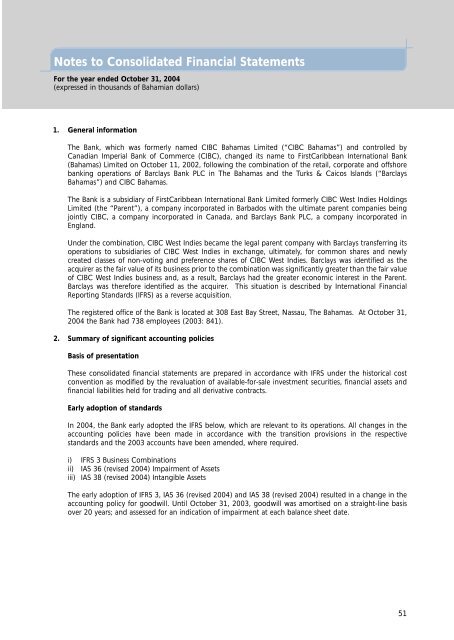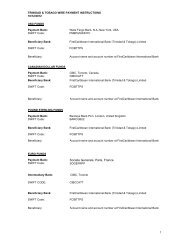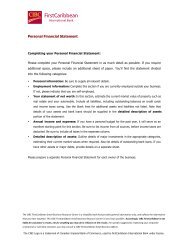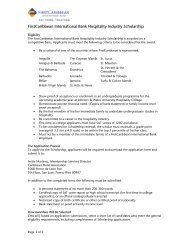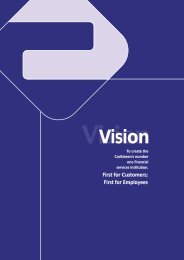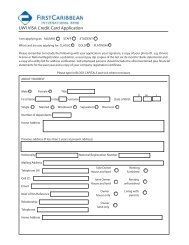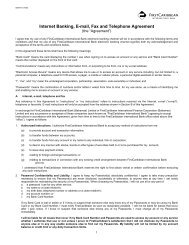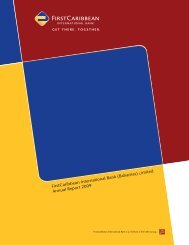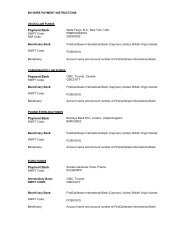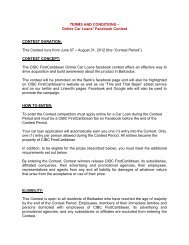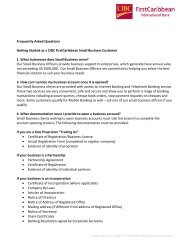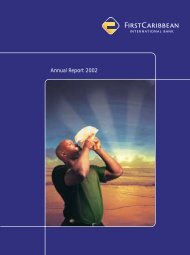FirstCaribbean International Bank (Bahamas) Limited
FirstCaribbean International Bank (Bahamas) Limited
FirstCaribbean International Bank (Bahamas) Limited
Create successful ePaper yourself
Turn your PDF publications into a flip-book with our unique Google optimized e-Paper software.
Notes to Consolidated Financial Statements<br />
For the year ended October 31, 2004<br />
(expressed in thousands of Bahamian dollars)<br />
1. General information<br />
The <strong>Bank</strong>, which was formerly named CIBC <strong>Bahamas</strong> <strong>Limited</strong> (“CIBC <strong>Bahamas</strong>”) and controlled by<br />
Canadian Imperial <strong>Bank</strong> of Commerce (CIBC), changed its name to <strong>FirstCaribbean</strong> <strong>International</strong> <strong>Bank</strong><br />
(<strong>Bahamas</strong>) <strong>Limited</strong> on October 11, 2002, following the combination of the retail, corporate and offshore<br />
banking operations of Barclays <strong>Bank</strong> PLC in The <strong>Bahamas</strong> and the Turks & Caicos Islands (“Barclays<br />
<strong>Bahamas</strong>”) and CIBC <strong>Bahamas</strong>.<br />
The <strong>Bank</strong> is a subsidiary of <strong>FirstCaribbean</strong> <strong>International</strong> <strong>Bank</strong> <strong>Limited</strong> formerly CIBC West Indies Holdings<br />
<strong>Limited</strong> (the “Parent”), a company incorporated in Barbados with the ultimate parent companies being<br />
jointly CIBC, a company incorporated in Canada, and Barclays <strong>Bank</strong> PLC, a company incorporated in<br />
England.<br />
Under the combination, CIBC West Indies became the legal parent company with Barclays transferring its<br />
operations to subsidiaries of CIBC West Indies in exchange, ultimately, for common shares and newly<br />
created classes of non-voting and preference shares of CIBC West Indies. Barclays was identified as the<br />
acquirer as the fair value of its business prior to the combination was significantly greater than the fair value<br />
of CIBC West Indies business and, as a result, Barclays had the greater economic interest in the Parent.<br />
Barclays was therefore identified as the acquirer. This situation is described by <strong>International</strong> Financial<br />
Reporting Standards (IFRS) as a reverse acquisition.<br />
The registered office of the <strong>Bank</strong> is located at 308 East Bay Street, Nassau, The <strong>Bahamas</strong>. At October 31,<br />
2004 the <strong>Bank</strong> had 738 employees (2003: 841).<br />
2. Summary of significant accounting policies<br />
Basis of presentation<br />
These consolidated financial statements are prepared in accordance with IFRS under the historical cost<br />
convention as modified by the revaluation of available-for-sale investment securities, financial assets and<br />
financial liabilities held for trading and all derivative contracts.<br />
Early adoption of standards<br />
In 2004, the <strong>Bank</strong> early adopted the IFRS below, which are relevant to its operations. All changes in the<br />
accounting policies have been made in accordance with the transition provisions in the respective<br />
standards and the 2003 accounts have been amended, where required.<br />
i) IFRS 3 Business Combinations<br />
ii) IAS 36 (revised 2004) Impairment of Assets<br />
iii) IAS 38 (revised 2004) Intangible Assets<br />
The early adoption of IFRS 3, IAS 36 (revised 2004) and IAS 38 (revised 2004) resulted in a change in the<br />
accounting policy for goodwill. Until October 31, 2003, goodwill was amortised on a straight-line basis<br />
over 20 years; and assessed for an indication of impairment at each balance sheet date.<br />
51


